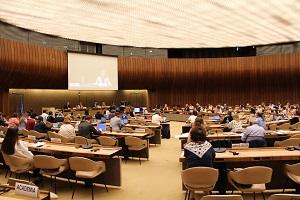
Last week, Parties to the UNECE Convention on Access to Information, Public Participation in Decision-Making and Access to Justice in Environmental Matters (Aarhus Convention) gathered alongside representatives of civil society, international organizations, academia, private organizations and other key stakeholders to take stock of progress and promote environmental democracy, taking a number of commitments at the third extraordinary session of the Meeting of the Parties (ExMoP3) and twenty-sixth meeting of the Working Group of the Parties (WGP26).
The meetings were held back-to-back in Geneva from 22-24 June 2022. ExMoP3 featured the election of the Special Rapporteur on environmental defenders and a corresponding Round Table, while WGP26 featured thematic sessions on access to information and on promoting the principles of the Convention in international forums.
Defending the defenders under the Aarhus Convention
At its third extraordinary session, the Meeting of the Parties focused its attention on the protection of environmental defenders, culminating in the landmark election of Mr. Michel Forst as Special Rapporteur on environmental defenders under the Aarhus Convention. The world’s first such Special Rapporteur, Mr. Forst will work to protect any person experiencing or at imminent threat of penalization, persecution, or harassment for seeking to exercise their rights under the Aarhus Convention.
To help inform the work of the Special Rapporteur, ExMoP3 featured a Round Table on Environmental Defenders, which invited environmental defenders, Parties to the Aarhus Convention and international organizations to discuss the main trends, challenges and good practices with regard to the protection of environmental defenders in the region and beyond.
Speakers noted that penalization, persecution, and harassment, including by State bodies, remain a pressing issue for environmental defenders. Harassment often takes the form of Strategic Lawsuits Against Public Participation (SLAPP), through which the judicial system is co-opted to intimidate and drain resources from environmental defenders, posing serious barriers to exercising and protecting environmental rights. At national level, the lack of specific legislation and coordinated policy actions undermines the ability to ensure that environmental defenders are protected as they do their work.
The speakers also presented encouraging initiatives, such as the EU’s proposed directive on SLAPP reform to environmental legislation in Kazakhstan, and the United Kingdom’s engagement connecting the protection of environmental defenders to broader issues, including those around business and human rights. The Office of the Public Defender of Georgia demonstrated how Ombudsmen institutions can protect and strengthen the position of environmental defenders.
At international level, there are clear synergies to be leveraged between the work of the Special Rapporteur on environmental defenders and other organizations and actors, including UN Special Rapporteur on the situation of Human Rights Defenders, the Commissioner for Human Rights of the Council of Europe, the International Code of Conduct for Private Security Service Providers, and the United Nations Environment Programme.
Representatives from FORUM-ASIA, the Pan-African Human Rights Defenders Network, and the Inter-American Commission on Human Rights enriched the discussion with perspectives from other regions and served as a reminder of the interconnected nature of many of the threats that environmental defenders face globally.
Reviewing progress and looking ahead at WGP26
At WGP26, Parties reviewed progress in advancing access to information, public participation, access to justice and in ratification of the amendment on genetically modified organisms, as well as recent developments related to compliance matter and opportunities for capacity building, awareness raising, and promotion of the Convention.
Advancing access to environment-related product information
In the thematic session on access to information, panelists from Finland, Serbia, the European Environment Agency, the International Trade Centre, UNECE, and the European ECO Forum presented on advancing public access to environment-related product information.
Discussion focused on the ways in which environmental awareness and education among the public, especially children and youth, and access to sufficient product information are critical to enable consumers to make informed environmental choices and support sustainable consumption and production. The Working Group called on Parties, partner organizations and stakeholders to continue implementing or supporting as relevant such tools as ecolabelling, energy labelling, product passports, product declarations, warning labels, green public procurement, code of conduct and purchasing mechanisms and pollutant release and transfer registers to promote the disclosure of information by operators to the public.
Promoting environmental democracy in international processes on plastics and business and human rights
At the thematic session on promoting the principles of the Convention in international forums, representatives of France, Portugal, the United Nations Environment Programme, the Office of the High Commissioner for Human Rights, and the European ECO Forum considered challenges, opportunities, and good practices in promoting Aarhus principles in ongoing negotiations for legally binding instruments on plastics and on business and human rights.
Participants welcomed progress made in promoting the Convention’s principles in these areas but recognized that more effort is needed to further transparency and effective public participation to ensure that these mechanisms are inclusive and reflective of the full range of stakeholders in both processes. The Working Group called on Parties to continue working to promote the principles of the Convention in these forums, as well as in international decision-making related to biodiversity, climate and nuclear matters. Participants also noted challenges in promoting the principles of the Convention in processes linked to the International Seabed Authority, as well as in the context of COVID-19.
For more information, click here.